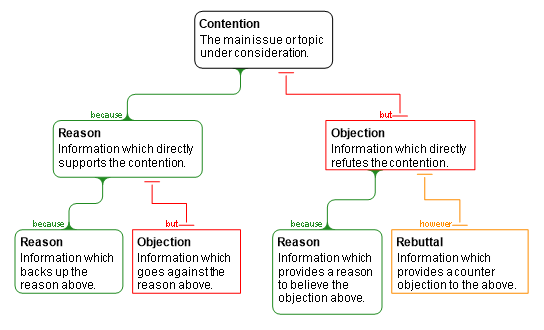Developing an argument
Learn the importance of developing a strong argument, including formulating a contention and using evidence effectively.
An argument is a pyramid of logic resting on a base of evidence.
Dr Tom Coverdale, Language and Learning Adviser
What is an argument?
Assessment tasks such as essays and oral presentations often require you to make an argument. Learning to make and defend an argument is important because it provides an opportunity to engage with and demonstrate critical thinking.
An argument is an opinion supported by reason and evidence. It is a series of linked claims that support your one main claim (the ‘contention’).
A claim is a statement that someone asserts to be true. These are your supporting arguments.
There are different ways to construct an argument in academic writing; however, you will typically need to provide the following elements:
- A contention (your main claim or ‘thesis statement’) that clearly states your argument.
- A series of claims in support of your statement, supported by credible and relevant sources of information.
- Consideration of counterarguments.
- A logical flow from contention to conclusion.
So, how do you go about developing an argument?
Formulate a contention
Your contention (or ‘thesis statement’) guides your entire essay. You will need to clearly state your contention in your introduction.
It should be arguable with reliable evidence, and specific and narrow in focus.
More work is needed to reduce intimate partner violence for Australia to meet its human rights treaty obligations.
In this example, to make the argument that treaty obligations will not be met unless incidences of violence decrease, we must cite and analyse evidence. For example, evidence addressing the following questions might be cited and discussed: What work is being done currently to reduce intimate partner violence in Australia? What are the trends? Which obligations are being met or not met? What are the relevant details of the treaty?
Some issues you will be asked to write about may be potentially emotive or in dispute. It is important to focus on your contention and supporting evidence to guide your writing and build your argument. If you feel like you are going off-track during the writing process, always return to your contention. You may also find that you need to adjust your contention as you refine your argument.
Explore the evidence
Gathering arguments for and against your contention will help you to refine your ideas and to develop better claims in support of your contention. Draw on multiple credible sources and expert opinions to support your argument, for example, peer-reviewed articles from credible journals or reports published by government agencies.
As you explore your supporting evidence, you will need to understand and evaluate the arguments of experts in the field. In your notes, try to connect ideas and group evidence according to themes and different points of view. It is important that you report your evidence accurately. By citing widely, your argument will be stronger.
When you cite authors in your final paper, do not only report what you have read. You should also interpret, analyse and comment on your sources. Respond to any relevant counterarguments you come across.
Plan your argument
Here are two suggestions for planning out your argument before you begin writing.
Develop logical paragraph structures
In your introductory paragraph(s), provide some background to the topic, clearly state your contention, and outline to your reader what you intend to show in the following paragraphs.
For subsequent paragraphs, use topic sentences that clearly state the supporting claim.
Use transitional phrases to guide readers through your argument, e.g. firstly, secondly, nevertheless, in particular, alternatively, furthermore.
Learn more about writing clear topic sentences and structuring paragraphs.
Use reason, evidence, and a degree of caution
When making an argument to support your contention, do not use emotive or highly persuasive language. In most cases, you will be expected to present a logical series of claims that support your argument, with relevant citations.
In academic writing, it is essential that you report evidence accurately, but it is also important that you show some degree of caution in the language you use to report your claims.
| Avoid unreasonable certainty | Use cautious language |
|---|---|
| This research proves that... | This research suggests that... |
| There is obviously a link between... | Research indicates that there is a link between... |
Note too that discipline styles and assessment requirements differ, so ensure you review your marking rubric. In addition, observe the writing style used in your recommended unit readings and use these to guide your writing style.
Learn more about academic style.
Common errors when developing an argument
- Avoid drawing a conclusion based on insufficient evidence or evidence from only one source of information.
- Resist the temptation to ignore relevant counterarguments.
- Avoid mispresenting supporting evidence.
- Avoid logical fallacies: see guide below.
In summary
- Arguments presented in academic assessments require a clearly stated contention, followed by a logical series of claims supported by credible evidence.
- Map the logic of your argument before writing. Avoid errors in reasoning, also known as ‘logical fallacies’.
- Use clear and logical paragraph structures.


